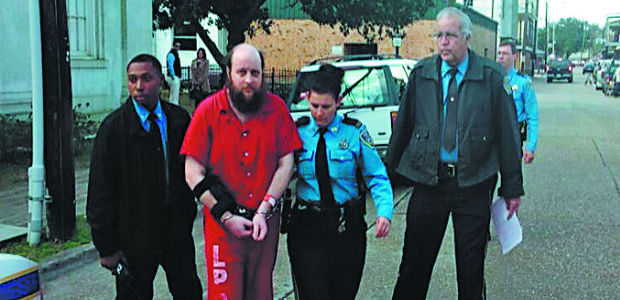
Colonels’ hoops relying on leaders for offense
February 19, 2014
Museum Wants You! Local facility expanding membership
February 19, 2014The Thibodaux man who sawed off his son’s head will not be punished.
Jeremiah Wright, judged as not guilty of first-degree murder by reason of insanity on Friday, will instead be confined at a state mental health facility indefinitely. Medical experts retained by the defense and by the prosecution concurred last week in their professional judgments that Wright was psychotic when he beheaded 7-year-old Jori Lirette and that the 32-year-old remains psychotic today. It was repeated by both sides multiple times Wright had a “major mental disorder that prevented him from knowing right from wrong” when he killed Jori.
To some, like Jori’s grandfather Dale Lirette, this conclusion to 2 1/2 years of slow-moving criminal proceedings is unsatisfying. The family does not feel justice was served, Lirette said. Should Wright’s mental illness be cured five, 10, 30 years from now, which would require the state to release him, Wright will have gotten away with murder, Lirette said.
“It’s just tragic,” Lirette said. “It’s so unfair.”
Lirette said he’s concerned Wright will be released one day and offered the opinion Wright faked his illness to navigate the court system, a theory expressed throughout the criminal proceedings but shot down by experts last week.
State and federal law offer protection from prosecution to suspects who commit a crime by society’s standards but were unaware their actions were wrong.
“Our justice system ties punishment to criminal responsibility. A link which reaches far back to English law and its Judeo-Christian roots,” said Katherine Mattes, Tulane University Law School professor with an emphasis on mental illnesses as they relate to crime. “When a person’s mental illness is so severe that it prevents him from understanding that his conduct is wrong, then the link between punishment and criminal responsibility is severed. We may protect our community by confining him to a hospital or treatment facility if he continues to be mentally ill and continues to pose a danger; however, punishment is no longer a legitimate goal.”
By way of a complex thought disorder, hallucinations and a delusional worldview that held him as the subject of a multi-agency social experiment, Wright came to conclude Jori was not a human being but a valve to release himself from tormenting voices and idiotic shame for believing his actions were anything other than the punch line of a cosmic joke. He related this to several psychologists and psychiatrists who interviewed and observed him in the years after the homicide, those doctors testified.
Jori, who required round-the-clock care, had cerebral palsy and heart complications that began at birth. He used a wheelchair for mobility and was fed through a tube. Jori weighed 10 ounces when born and spent the first year of his life inside a hospital.
Wright decapitated Jori over the kitchen sink at the family’s Thibodaux home, he confessed to police, and went on to dismember the boy. Wright put Jori’s body parts in a trash bag and left his head alongside the road, where it was spotted by a passerby, according to police.
District Attorney Cam Morvant II, who sought the death penalty, with some anguish ceded to evidence Wright was incapable of understanding his actions at the time of the crime, Morvant said. Wright’s principal defense attorney, District Judge John LeBlanc and Morvant all said the rare adjudication of not guilty by reason of insanity was the only realistic ending to the high-profile saga.
“Justice was done today in a way the system was designed for justice to be,” said Kerry Cuccia, director of the Capital Defense Project of Southeast Louisiana. “Whether you call it the best- or worst-case scenario, it is the result that the law ordains.”
LeBlanc said he intends to apply intense scrutiny to any hearing regarding Wright’s release from the Eastern Louisiana Mental Health System.
“This was absolutely the only decision that could be made based on (Wright’s) medical history and testimony,” LeBlanc said during the ruling. “It is not a good day for (Jori’s family). It is not a good day for anyone involved. … I believe (Wright) should be kept in jail for the rest of his life.”
And the district attorney said he’ll oppose any efforts to release Wright.
“I will do everything in my power to make sure he’s never released,” Morvant said.
DOCTORS BELIEVE PSYCHOSIS GRADUALLY SET IN
Prior to the homicide, there were signs that Wright harbored mental trouble.
Wright was assigned to the foster care system in 1994 after his mother, who was addicted to drugs, was stripped of her maternal rights, according to testimony last week.
It was in a foster home where Wright was seen talking to a wall, which he once asked if he should shoot a person. On Feb. 10, 1995, a therapist treated a then 13-year-old Wright and reported he was strange, slow to respond, depressed and exhibited a dull expression. Wright told the therapist he was joking about the visual hallucinations.
Sixteen years later, on Feb. 22, 2011, Wright was admitted to Ochsner St. Anne General Behavioral Health Center after showing up at a friend’s urging, to whom Wright confided he was hearing voices, according to the court record. Wright was discharged a week after his intake with a diagnostic impression of psychotic disorder not otherwise specified; he was prescribed antipsychotic medication.
Expert witnesses drew on both anecdotes, as well as a 2008 visit to a local hospital emergency room and records from a mental health clinic, as evidence Wright gradually became psychotic.
Wright came to believe a chip was implanted in his head at an early age, according to testimony last week by Sarah Deland, a forensic psychiatrist retained by the defense who interacted with Wright on four occasions.
Wright heard multiple voices partaking in a running commentary of his life; the voices started friendly but devolved into castigation, he allegedly told Deland.
Wright then came to subscribe to a delusion that held him as the centerpiece of a conspiracy, in which Jori was an inanimate “prop” rather than a person. Wright said he felt he had to kill Jori – whom he referred to as a robot and a CPR dummy in various settings – in order to find his release and attain glory, Deland and others testified.
Forensic psychiatrist George Seiden, retained by the state to examine Wright’s mental health at the time of the homicide, concurred with Deland. They were the only two witnesses called at the pre-trial adjudication.
During an interview with Wright last December, Seiden asked the suspect why he choose to behead Jori. “I wanted to see the insides, I guess,” Wright responded, according to Seiden.
During a five-day hearing to determine Wright’s competency to proceed to trial just more than one year ago, other psychiatrists and psychologists testified Wright made similar statements to them.
“He doesn’t really appreciate the jeopardy he’s in,” neuropsychologist Joseph Sesta said last year, adding Wright believes he will go home without punishment because “he thinks the coroner will blow the whole thing open at the 11th hour when he holds up a plastic head.”
That hearing set out to determine Wright’s ability to understand the nature of the charge against him and assist in his defense; it did not examine Wright’s health at the time of the crime.
WRIGHT’S DELUSION TOO COMPLEX TO FAKE, DOCTORS SAY
Prior to the competency hearing, Wright was discharged from ELMHS with a diagnostic impression of psychosis versus malingering with a history of marijuana dependency on July 18, 2012. One month later, the hospital scrapped both psychosis and malingering from a second discharge sheet.
Malingering, the act of exaggerating an illness’ symptoms for a specific purpose, was heavily debated during the five-day hearing.
One psychologist who examined Wright at ELMHS invalidated a personality assessment exam because he felt Wright was “faking good,” the psychologist testified last year. A second psychologist said a test he administered ruled out malingering.
But state doctors, drawing from notes made by the facility’s security guards, initially came to conclude he faked the illness. Wright allegedly told one guard he did not fear the first-degree murder charge because he was on “Easy Street” with a good family and a good lawyer. A second guard noted two days later Wright allegedly admitted to wanting to rid himself of Jori and that he hoped to receive a Social Security check after being released.
Ultimately, Wright was ruled incompetent to stand trial after the defense – led that week by Cecilia Bonin and Mildred Methvin – convinced LeBlanc there were clear gaps in the state doctors’ discharge rationale.
Both Deland and Seiden said Wright has a major thought disorder, which is not easy to fake. They referenced the way he uses language and the way his conversation skips in seeming non-sequiturs.
Some of Wright’s comments – such as referring to Jori as his “son until the end” while at ELMHS – could have been learned behavior, they said.
“It’s almost impossible to fake the kind of thought disorder” Wright exhibited, Seiden said. “It makes so much crazy sense, if you will. … He’s capable of saying the right thing, but that does not mean he believes what he’s saying.”
WRIGHT CONFINED AT MENTAL HEALTH HOSPITAL
Per LeBlanc’s ruling, Wright will be returned to ELMHS. He will be kept in a special security area in the system’s forensics division and compelled to take antipsychotic medication, according to testimony. Doctors will issue progress reports to the court every six months.
There is a path for Wright and all defendants judged not guilty by reason of insanity – who are not convicted of a crime – to achieve release, but it is highly unlikely Wright will ever attain that clearance, said Mattes, the Tulane law professor.
“A person can be institutionalized or detained in a mental health institution indefinitely if they’ve been found not guilty by reason of insanity,” Mattes said. “That detention can continue as long as that person is both mentally ill and a danger to himself or others.”
The U.S. Supreme Court ruled in the landmark case Foucha v. Louisiana (1992) that a person acquitted as not guilty by reason of insanity cannot be detained in the event a mental illness is cured. Being a danger to himself and others is not alone cause for indefinite detention, because the person has not been convicted of a crime.
“In Foucha, the issue was: ‘Can you continue to detain someone who is dangerous if they are no longer mentally ill?’ The answer was clearly, from the U.S. Supreme Court, that no, you cannot,” Mattes said.
If Wright indeed has a schizoaffective disorder, as is the opinion expressed by Deland, his chances of release are slim because it is considered by many experts a chronic illness and has already proven to be dangerous in Wright’s case.
“In my experience, as a practical matter, it would be extraordinarily unlikely that any judge, certainly no time soon, is going to be making a finding that (Wright) doesn’t pose a danger to himself or others,” Mattes said.
Jeremiah Wright is escorted out of the 17th Judicial District courthouse in Thibodaux after District Judge John LeBlanc accepted his plea of not guilty by reason of insanity for first-degree murder. Wright confessed to beheading his 7-year-old son in 2011 but his mental state at the time prevented him from differentiating right from wrong, medical experts testified.













